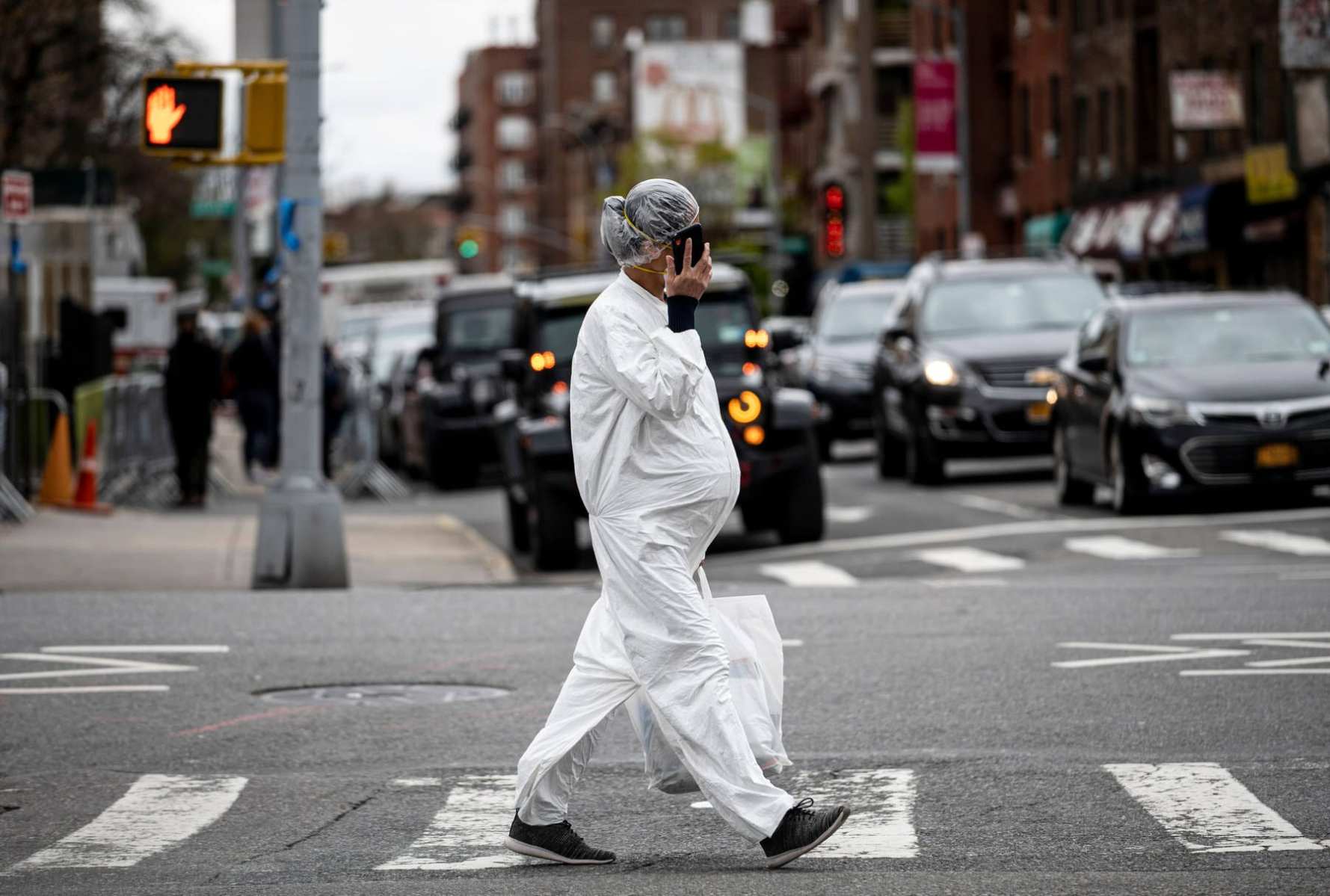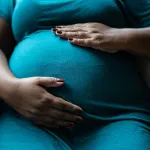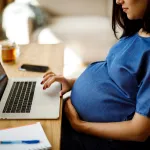It seemed like such a simple request at the time: Tesia Buckles wanted to keep a water bottle with her at work.
She was early in her first pregnancy, in March 2020, and the coronavirus was just beginning to spread. Water fountains at the store where she worked were shut down and Buckles was spending most of her days in a daze of sickness. She threw up at work when she had to, but even then, the cloud of fatigue that followed her rarely ever lifted. Her doctor had also just told her she was anemic.
The only water source was at the exact opposite end of the store from where Buckles operated the deli counter, next to the sweltering heat of ovens. If she could have a bottle at her station, she wouldn’t have to excuse herself often and leave the deli unsupervised for a water break, she reasoned at the time.
But, she said, her managers denied the request, arguing that she could not have water next to an area that served food. She said her request to switch to another department at the store was also denied.
“I wanted to be able to provide the most for my child. For such a basic thing as water, but such an important part of pregnancy that you need, to be denied from you? I just felt like my child’s health was deteriorating and I couldn’t do anything about it,” said Buckles, 21. “The only control I had, I felt, was just quitting.”
It’s a decision many pregnant workers have been forced to make in the absence of clear regulations on how employers should accommodate their pregnant employees.
Pregnancy discrimination was already outlawed through the Pregnancy Discrimination Act of 1978, but vague language in the law about exactly how employers should accommodate pregnant workers has spawned numerous lawsuits, many of them unsuccessful.
To close those loopholes, Congress has been considering the Pregnant Workers Fairness Act since 2012, a law that would clarify the responsibility employers have to accommodate pregnant employees and strengthen protections by removing a provision that put the onus on workers to prove they needed to be accommodated.
A decade ago, the bill got little attention. But last year in September, it passed the House with bipartisan support, with every Democrat voting in favor and 103 Republican joining them. It has gained the support of the U.S. Chamber of Commerce, and 30 states across the country have already adopted their own versions — including Southern states like Kentucky, Tennessee and South Carolina. The pandemic and the election derailed a Senate vote last fall, but this year, advocates think the bill is finally poised to pass. It has 19 Republican cosponsors in the House.
The bill will have to be voted on again in the House. It moved to markups in that chamber this week and advocates expect a vote in the coming weeks.
“[In 2020], more Republicans voted in favor of this bill than voted against it, which I think really shows that everybody understands it’s such a no-brainer of an issue,” said Michelle McGrain, the director of congressional relations and economic justice teams at the National Partnership for Women & Families, one of the groups advocating for the bill.
The issue is also an economic one: Protections for pregnant workers help keep people employed, something that is particularly critical after the pandemic recession devastated employment for women and LGBTQ+ people.
Low-wage workers, who are predominantly workers of color, are the most vulnerable because they are most likely to work in positions with fewer labor protections.
Several years ago, A Better Balance, the organization that helped kickstart the push for a change in the law, set up a hotline for workers to call if they faced pregnancy discrimination. A pattern quickly emerged: Many of the pregnant people calling were working in low-wage jobs where they were told to take unpaid leave or encouraged to quit when issues of pregnancy accommodations came up, said Elizabeth Gedmark, the vice president of A Better Balance.
It was immediately clear the loopholes in the current legislation were hurting those at the intersections of race, gender and class, she said. And some employers were refusing to offer accommodations because the law didn’t explicitly require them to — unless a worker could prove their employer had made an accommodation for someone else.
Now, more than ever, passing the law is “a talent development and retention issue,” Gedmark said. “We need every woman who can be working to be working to reverse the concerning trends of women leaving the workforce.”
Buckles’ decision to quit wasn’t one she arrived at lightly. She lives in a small town in Missouri with few options for a then-20-year-old. The fast food jobs were too hot and stressful on her pregnancy. The factories were, too. And there were two major retailers — but she had already quit from one. Her fiance was also working at the same store she left.
The job applications she filled out all asked why she had quit and she hesitated each time she explained it was because of pregnancy accommodations. Who wanted to deal with that when they could hire someone else?
Shortly after Buckles left her job, her fiance was promoted at the store, giving them some cushion to wait out the pregnancy. Their son, Oscar, was born in November. She’s still applying to jobs.
“I really thought I wasn’t going to be able to provide, or neither of us,” she said. “I’m sure that’s not everyone’s dream when they have a child.”
The way the law is currently written, pregnant workers have to prove that their employer has been able to accommodate another employee in the same facility who is in a similar position in their “ability or inability to work.” But pregnancy is a complex situation to replicate or compare with other issues that may impair an employee’s ability to perform a job, and workers are often unable to meet the law’s requirement.
“The courts have made this a really high standard,” Gedmark said, which has led many of the cases to fail. In one 2018 case, in which a FedEx worker requesting lighter duty created a spreadsheet of 261 other employees who were accommodated with work reassignments or lighter loads, the court still threw out the examples as too dissimilar from the worker’s own case in part because they did not involve pregnant workers in a similar role as her.
“It feels like [the courts] are doing backward somersaults to get out of providing benefits for pregnant workers,” Gedmark said.
The fallout can be severe. Four women in one warehouse miscarried in 2014 after the site’s contractor denied requests for workers to carry lighter loads. One of those women had already miscarried in 2008 while working at the same facility. Her managers denied her a chair and light duty in 2014, despite a note from her doctor, and she lost a second baby. The workers say the losses were in connection to the lack of accommodations. Doctors say there is “a slight to modest increased risk of miscarriage” when carrying extensive loads. At the time, the contractor called the allegations “unsubstantiated” and filled with inaccuracies.
The lack of clarity in the law also creates a problem for employers who are unsure as to the degree they need to accommodate pregnant workers. It opens them up to costly litigation and could lead to retention issues.
That’s why the U.S. Chamber of Commerce, a typically right-leaning group that lobbies on behalf of businesses, agreed to look into the issue with advocates. In drafting the language of the bill, the groups were intentional about expanding the accommodation requirements already present in the Americans with Disabilities Act — which employers are familiar with — and extending them to pregnant workers. The bill also carried over a threshold provision that excluded the smallest businesses with fewer than 15 employees, as well as a provision that notes the accommodation must be provided in the case that there is an alternative.
For example, if the business requires employees to lift only 75-pound boxes, and there is not an option for a lighter load, then a reasonable accommodation does not exist. But if the business requires workers to carry boxes with a range of weights, the employer must accommodate the worker with lighter loads.
The bill is also intentional in its language to specify the law applies to a “worker,” more inclusive terminology that refers to all people who may become pregnant.
“Employers currently face great uncertainty about whether, and how, they are required to accommodate pregnant workers,” the chamber wrote in a letter to Congress in September. “The revised [Pregnant Workers Fairness Act] would clarify an employer’s obligation to accommodate a pregnant employee or applicant with a known limitation.”
Business support has helped carry similar bills to passage in states like Kentucky and Tennessee.
Sarah Davasher-Wisdom, the president and CEO of Greater Louisville Inc., the regional chamber, said the group took on a similar pregnancy accommodation law after hearing from businesses that wanted to clarify the patchwork of rules, reduce litigation and keep workers on the job. Since the Kentucky bill passed in 2019, only a small number of claims have been filed, she said, and few have gone to court.
“We’ve really changed the discourse in many ways because we are a chamber of commerce that was backing an unconventional issue and I think that was very important to the path forward on this,” Davasher-Wisdom said.
In Tennessee, Republican state Sen. Becky Duncan Massey also sponsored the legislation after working with business groups to fine tune the language so that small businesses would not be affected.
Massey had worked extensively with disability legislation and saw a natural connection.
“It’s a common sense approach to a situation that we need done,” Massey said. “ When something just makes sense, you might not be able to get it done immediately but once you educate folks on the need and the problem and the solution, usually you can get it over the finish line. I’m hopeful that they’ll take care of it at the federal level also.”
The law passed in Tennessee in 2020 with unanimous support.
With a vote expected soon on the bill in the House, advocates are already working to drum up support among Senate Republicans, which they expect to gain.
“The support is there. It’s supported by the public by a huge margin, it’s supported by businesses and the business community. It’s supported by advocates, by pregnant workers themselves, by members of Congress across the aisle,” said McGrain. “It’s really a win-win-win for everyone. And there’s no reason that this bill shouldn’t get signed into law.”
Democratic Sen. Bob Casey, who will be the lead sponsor of the bill in the Senate, said he expects to reintroduce the legislation in several weeks, calling it a “bipartisan bill” that will ensure expectant people have the “right to request the accommodations they need to continue working safely during pregnancy.”
But it’s only one tool in a toolbox that has for decades lacked protections for working mothers. With renewed focus, part of it spurred by the pandemic, advocates are starting to turn their attention to other gaps in existing legislation that could help mothers stay employed.
Last week, the House held a hearing on the pregnant workers act and the PUMP for Nursing Mothers Act, a lesser-known bill that would end the unintended consequences of a 2010 law designed to create accommodations for nursing mothers who needed break time to express breastmilk. Because the law was signed as a part of the Fair Labor Standards Act, existing exceptions in the act applied to the Break Time for Nursing Mothers Law. The result was that some 9 million workers in certain occupations, including nurses, teachers and software engineers, were also exempt from the pumping protections.
The PUMP Act was introduced in Congress in 2020 and garnered one Republican co-sponsor, but the support is not as robust as the pregnancy discrimination bill and it was never voted on. The bill has not yet been introduced this year.
“We are still doing a lot of the public education around the issue. There is still oftentimes a lack of understanding of why did this happen and why would there be these gaps,” said Gedmark of A Better Balance. “We also still have some lawmakers who are uncomfortable talking about breastfeeding and still cringe to hear that word.”
It’s a sign, she said, of the work that is still left to be done to reach parity, so that workers are appropriately accommodated and not made to feel invisible.
Absent that, workers like Buckles said they don’t feel empowered to be part of the labor force.
At the time she quit her job, she said she thought she “couldn’t be the only one going through this.”
For her, the possibility of the law’s passage is exciting because she said she feels it could “help a lot of people,” Buckles said. “I know some people who are afraid of being pregnant. … Hopefully that law will give them some peace that now this is definitely illegal.”






